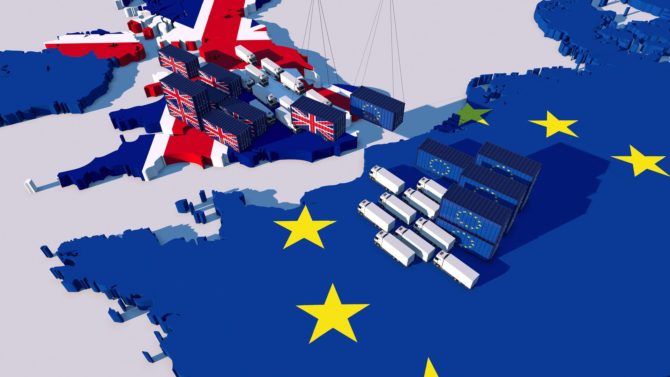Shopping and shipping: sending parcels to France post-Brexit

Leaving the EU has meant all kinds of changes, both practical and administrative, for British residents in France. The transportation of goods in either direction across the Channel is now subject to various regulations (and in some cases customs charges) and working out what to buy and where can be tricky, especially as delivery charges can vary too.
If you have an ‘overseas foods’ aisle in your local supermarket, you may have noticed that the British section has fewer products available and the prices have increased. If you enjoy specific British-branded products such as Heinz beans or PG Tips tea, or you simply yearn for a taste of home from time to time, you may be better off ordering via one of the online stores that deliver to France.
Two of the best known and longest established stores are British Corner Shop and British Store Online . Both offer a wide range of typical ‘British’ foodstuffs, seasonal items and special offers, and if you do place an order it is worth doing a bulk shop in order to benefit from economies of scale where delivery charges are concerned. For example, 5kg of shopping with British Store Online costs €7.95 in delivery whereas a whopping order of up to 30kg is only €12.95. British Corner Shop uses the ‘delivery duties paid’ option and British Store Online ships from within Europe, both meaning that there are no additional charges or surprise costs for the customer.

ORDERING FROM THE UK
When it comes to customs formalities and charges, all online purchases coming from the UK are now subject to the same rules and regulations applying to packages from any other non-EU country. This means that as soon as the parcel arrives in France, the transporter, e.g. Chronopost, FedEx, TNT etc, has to complete the customs clearance forms and pay any applicable duty and tax. Once this has been done, the parcel can be delivered.
Delivery times may also be slower, due to logistics, and a customs check (contrôle douanier) can also slow things down. In addition to delivery charges, when buying goods outside the EU, you now need to factor in TVA/VAT (taxe valeur ajoutée) which is usually charged at 20%, and if the items concerned have a value of more than €150 or have a provenance from outside the UK/EU, then additional charges will apply. If the products are British and you can prove the origin, there will be no customs charges to pay.
It is always best to check with the seller and verify that the provenance of the product in question is clearly stated on the invoice. In any case, it is absolutely essential to check the ‘conditions of use and sale’ (conditions générales de vente) to verify whether the TVA and customs charges are included in the sales price or will be added afterwards when the items are delivered. These charges will usually be down to you to pay and payment will be requested either before the package is delivered or upon delivery. 
SENDING TO THE EU
In terms of sending items to the EU, various things have also changed, with goods sent from the UK to the EU (regardless of the value) now subject to EU VAT. The only exception to this is if you are not a business and you’re sending a gift up to a value of £39/€45.
There are currently three options available to commercial sellers to pay EU VAT and customs charges when sending a parcel to the EU. The first is Import One Stop Shop or IOSS. IOSS is designed for businesses and marketplace sellers sending UK goods to EU consumers up to a value of £135/€150. It saves UK businesses, online sellers and their EU customers, time and effort by dealing with VAT at the point of sale rather than the point of import or prior to delivery. If you sell using an online marketplace you will be given an IOSS number by the marketplace as they are now responsible for EU VAT compliance on UK goods sold to EU consumers up to this value and the number will need to be entered when booking transportation of your parcel.
There are two situations where IOSS is not a suitable option and these are when you are a business or marketplace and you are sending goods valued over the £135/€150 threshold or you are a private individual, sending between the UK and the EU.
In these scenarios there are now two payment options available for paying EU VAT and customs charges. The first is Delivery Duties Paid or DDP. DDP means you pay all customs, duties and fees before sending goods to your recipient in an EU country. This is a much better option for your recipient; they know exactly what they have to pay and there are no unexpected extra costs. Many of the parcel delivery services now offer DDP as a payment option during the order process and this will be shown as a ‘pre-pay delivery duty available’ icon on the quote results page. Pre-payment means faster processing at customs and the charges are also lower.
The second option is Delivery Duties Unpaid or DDU and in this case the EU recipient pays all customs, duties and fees after their goods have arrived in the destination country. In this case, either local customs or the transporter will contact the recipient and ask for any outstanding charges before their goods are released for final delivery. Parcels will be held by customs until payments are made and any unpaid sums may lead to packages being returned or even destroyed; this is clearly not ideal for small businesses.

POSTING A PARCEL
If you want to ship a parcel yourself, perhaps a gift for friends or family, there are a range of parcel delivery services available. However, the ‘post-Brexit’ range is smaller and prices are higher.
The better known names such as TNT, UPS and DHL are still shipping from France to the UK and vice versa, and using the Packlink comparison site is likely to throw up the best prices currently available.
There are various other parcel comparison sites including Parcel2go and ParcelHero, two well-known and reputable comparison sites.
All of the transporters listed on the sites offer slightly different terms and conditions. Some will collect the parcel directly from you, ideal for heavy or awkward packages. Others will require you to drop the parcel off at a depot. Make sure you know where your nearest depot is before clicking ‘confirm and pay’; I once found what I thought was a bargain delivery slot before realising that dropping the parcel off was going to involve a 40km round trip to a town I had absolutely no need to go to!
If you are not in a hurry and can be flexible on timing, you can also often get a better price that way too (just like any other booking, last-minute deals can often mean big discounts). The UPS site is user-friendly and easy to navigate. The Delivengo site, the La Poste arm for international parcels, is equally easy to use. Delivengo promises the lowest tariffs on the market for small parcels (up to a maximum of 2kg) and delivers to 190 countries throughout the world.
However, where you will need to be careful when sending a parcel is making sure that neither you nor the recipient incurs any extra charges, which means that you will need to ensure that the total value of your parcel is not more than the EU VAT threshold of £39 or €45 for gifts, which includes the cost of both goods and shipping. Happy shopping and shipping!
REMEMBER!
If you’re sending an item purchased from an online marketplace, such as eBay or Amazon, even if you consider the item a ‘present’, it will not be considered a gift under the new regulations and will incur TVA. When shopping online, choosing DDP (Delivery Duties Paid) provides peace of mind!
Check out the official rules and regulations
Share to: Facebook Twitter LinkedIn Email
More in Brexit News


